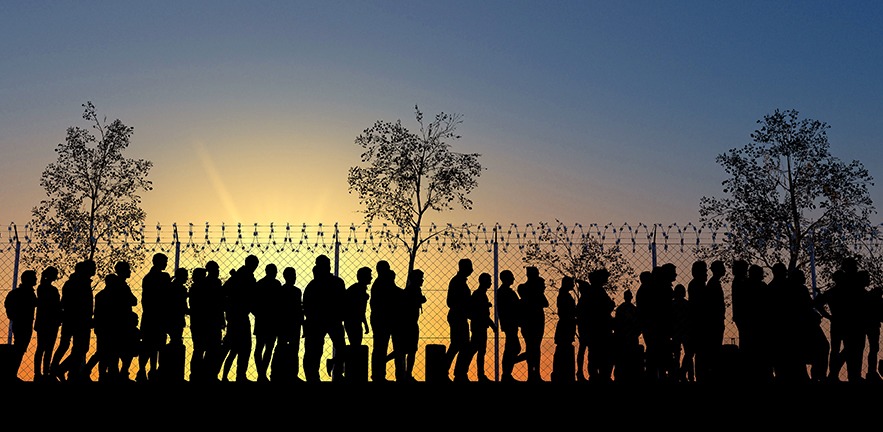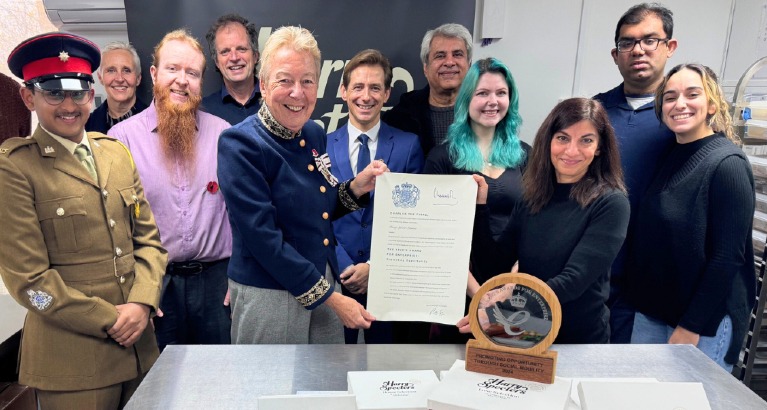In this special insight article, we look at some of the work done at Cambridge Judge to highlight issues affecting the marginalised and point a way forward to solving them and we also talk to some of those involved in these important initiatives.
The business world and business media, are often dominated by mainstream success stories about growing sales, profits and customer numbers – and famous business books likewise exhort managers to drive their firms from ‘Good to Great’.
Cambridge Judge Business School, for its part, has certainly chronicled such business successes, with research on topics ranging from boosting productivity to efficient project management to scaling up entrepreneurial firms so they are – to cite another legendary business book by the same author Jim Collins – ‘Built to Last’.
Yet a closer look at research and other initiatives by Cambridge Judge faculty and students also yields a very different focus: a look at marginalisation and marginalised communities and ways to overcome the isolation, discrimination and indignities endured by the marginalised.
This research focuses not on becoming great and world beating, but rather on how to help struggling communities carry on with hope, respect and greater prosperity. This focus is both good and great, in different ways and is certainly built to forge lasting benefits to those in need.
Such a focus on the less privileged, is, in some ways, a natural offshoot of the leading work done at Cambridge Judge in studying society’s ‘grand challenges’ – ranging from poverty to climate change to ensuring health in an aging population – because these wicked problems are often felt most keenly by people in developing countries, poorer communities and those with fewer educational opportunities.
“We have put equality, diversity and inclusion (EDI) at the heart of everything we do at Cambridge Judge and research into how to overcome marginalisation of every kind is a core part of that,” says Lionel Paolella, Associate Professor in Strategy & Organisation and Chair of the Equality, Diversity and Inclusion (EDI) Committee at Cambridge Judge. “Just as businesses can do well financially by doing good in areas like the environment and social justice, business schools advance societal knowledge in many ways that go beyond more traditional business areas such as finance and marketing.”
Rationing end of life care and the morals of morality
The world is getting older and in many ways that’s a great achievement for humankind. The average life span in many developed countries has soared from the low 40s to nearly 80 since 1840, or an astonishing 3 months of extra life each year over the past 180 years.
Yet caring for the increasing number of people living to a ripe old age posts huge issues for societies and individuals in many countries around the world including the UK, Germany and Japan. As sad as it certainly sounds, communities and governments have to ration end-of-life care in order to provide at least some care to all in need.
A study on this topic co-authored by Shaz Ansari, Professor of Strategy & Innovation at Cambridge Judge, was recently named ‘EGOS Paper of the Year’ by the European Group for Organizational Studies at its annual Colloquium. The award goes to a paper that demonstrates “methodological rigor, theoretical relevance, innovativeness and new insights into organisational phenomenon”.
The paper argues that we need a “holistic societal debate about palliative care in ageing societies” that involves carers, policymakers and patients themselves – and Shaz was surprised by the willingness of many end-of-life patients to talk about the subject.
“We expected ‘closed doors’ but were overwhelmed by the openness of individuals to share their experiences,” says the study published in the ‘Academy of Management Journal’.
Key to the study, set in Germany, were the efforts by carers to speak to patients about the moral issues posed by the need to care for so many elderly patients, which enabled patients to “attach a new morality to time” and no longer view conflicting priorities as necessarily “oppositional”.
Changing the meaning of disability
Another recent study co-authored by Professor Shahzad (Shaz) Ansari re-examines society’s approach to the subject of ‘disability’, suggesting that even the word itself feeds unconscious marginalisation by suggesting an abnormality.
This study, also set in Germany and published in the ‘Academy of Management Journal’, calls for a collaborative process that encourages people with impairments to become ‘internal activists’ and thus awaken others to question a status quo that was previously accepted without much thought.
“This study made us think hard about our role as academics in perpetuating marginalisation,” says Shaz. “Studies about victims of overt forms of marginalisation are very important, of course, but there has been little research into situations where people are oblivious to their own marginalisation. We hope that the findings will encourage marginalised people to sample self-determination as a way to both gain confidence themselves and then inspire others.”
Healthcare is a big challenge in marginalised communities
A report last year by the Centre for Business Research at Cambridge Judge focused on health care in Gaza, which called for creation of a technical collaboration platform to improve health care and thus address the marginalisation of many Palestinians.
“Palestinians’ right to health is highly politicised,” said the report by CBR Research Fellow Dr Mona Jebril. “The health sector in Gaza has emerged within the constraints and agendas of several occupations and internal conflict. Consequently, the Gaza health system has been shaped by a context of ‘de-development’ – a past and present that is characterised by fragmentation, negligence, marginalisation and dependency and which continues to affect the people of Gaza.”
Helping people at refugee centres from feeling ostracised
Several studies at Cambridge Judge have focused on how to overcome the marginalisation felt by people at refugee centres around the world.
A paper co-authored by Dr Helen Haugh, Associate Professor in Community Enterprise and PhD alumna Marlen de la Chaux, which was honoured with the ‘Best Article Award’ from the journal ‘Academy of Management Discoveries’, examined how parallel organisational structures (camp officials and refugees) at the Dadaab refugee camp in Kenya can act as a safety valve that serves as an important communication arrangement.
Another award-winning study, by Professor Michael Barrett and PhD alumna Corinna Frey, focused on how humanitarian organisations can better account for their operations given their usual rapid turnover of staff. “Humanitarian emergency organisations need to translate what counts,” says the study, which “sheds light on the question of how organisations enact their accounting practices over time and across space, of utmost importance in times of rising international emergencies.”
Another study co-authored by Michael Barrett, published last year in the journal Organization Science, explored the role of technology in helping the marginalised. Focusing on the mobile payment system in Kenya, the research outlined how an innovation that was initially seen as “small in scale and modest in scope” helped forge greater financial inclusion for millions of people as it “disrupted traditional flows of money” in the country.
Philanthropy can help overcome marginalisation
The Centre for Strategic Philanthropy at Cambridge Judge noted in its first report in December 2020 that greater Global North-Global South collaboration in philanthropy is vital to improving the lives of millions of people in developing countries.
“From climate change to poverty alleviation, pluralistic partnerships are critical to delivering system change and a convergence of multi-sector actors,” said the report, entitled ‘Philanthropy and COVID-19: Is the North-South power balance finally shifting?’
Most giving remains relatively small and fragmented and not aligned with what’s required for large-scale and enduring impact.
Professor Kamal Munir, Academic Director of the Centre for Strategic Philanthropy, said the report found early signs of a shift toward greater autonomy for Global South philanthropy and that this “could lead to positive operational and policy outcomes that can help deliver more sustainable and scalable social impact.”
“This report was really important in signalling that the time is ripe for a radical rethink of Global South philanthropy in contributing to the UN’s Sustainable Development Goals and delivering resources to where they are most needed on the ground.”
Cambridge Social Ventures seek to integrate people into communities
It’s not only faculty who are focusing on marginalisation at Cambridge Judge, as students and other participants on the Business School’s programmes have a similar focus.
Many of the enterprises supported by the Cambridge Social Ventures programme at the Cambridge Centre for Social Innovation focus on helping marginalised people overcome obstacles to full integration into communities.
These include, among current ventures:
- enterprises using video games to help vulnerable children receive high-quality therapy
- organising shipments of aid to support people in need owing to international displacement
- empowering under-represented female changemakers who are unafraid to voice their vision for a better world
- automating workplace adjustment processes to create workplaces where disabled employees can flourish
Masters in Social Innovation papers focus on combatting marginalisation
On the Masters of Studies (MSt) in Social Innovation degree programme, several theses have focused on ways to combat different forms of marginalisation.
A paper by Simon Dwight (Masters in Social Innovation 2017) examines the experience of homeless people in the English city of Bedford, finding that those able to build relationships outside the homeless community are better able to succeed in moving out of homelessness.
“Finding a way out of homelessness is not just a struggle for housing, it is a struggle for belonging,” says a summary of the thesis supervised by Paul Tracey, Professor of Innovation & Organisation, that is posted on the Business School’s website. “We identified 3 key elements in people’s journeys through homelessness: how they made sense of their situation; how they accessed information about help; and, crucially, the relationships they built.”
A study by Chelsea Waite (Masters in Social Innovation 2016) looked at the efforts of InZone, an academic centre at the University of Geneva, in working to implement a refugee-managed learning programme with Syrian refugees at the Azraq camp in Jordan.
The study, supervised by Jennifer Howard-Grenville, Diageo Professor in Organisation Studies, examined how InZone managed “to influence or bypass camp administrators who were apathetic or resistant to refugee management” of higher education at the camp.
The study shows “how small organisational actors can consciously and strategically harness the power of their ‘outsider’ status to pursue a change agenda in a cross-sector partnership.”
Joellen Nicholson (MSt Social Innovation 2017) focused in her thesis on how socially stigmatised women in Cambodia (including those with HIV-AIDS and single mothers) were able to “positively renew their sense of personal identity through organisational identification” when employed in a safe and supportive working environment.
The research focused on the fair fashion enterprise Tonle, which is dedicated to social justice for employees and zero-waste fashion production through repurposing and reusing scrap textiles.
“When given opportunity, socially stigmatised women in the Global South can actively engage in employment and benefit from it,” says a summary of the study, supervised by Neil Stott, Management Practice Professor of Social Innovation. “They value interpersonal connections, which can break patterns of isolation. Meaningful organisational identification allowed Tonle’s women to flourish” and increased their sense of self-worth.
The importance of networks and relationships for social impact
“These research studies by Masters in Social Innovation students (now alumni) demonstrate the importance of social capital for social innovation,” says Dr Michelle Darlington, Head of Knowledge Transfer at the Cambridge Centre for Social Innovation, who edited the theses summaries.
“We often assume that individual roles and actions are important, but social impact also happens when relationships are built. In these studies, we learn that homelessness is about more than just housing; it begins when relationships break down and it can end through inclusion in a community. We saw that refugee educational initiatives can provide purpose and community, as well as professional learning, when participant groups are given more responsibility. We also saw how workplaces can be organised to foster relationships, which can benefit the lives of socially stigmatised people.”
Featured programme/Centre
Short programme/Centre description.
[Note: use reusable block if one exists, if not use the format below]
Related articles
Student and alumni news
The King honours sweet social venture Harry Specters
Mona Shah, who founded the Harry Specters chocolate business after being inspired by her autistic son, was honoured with an MBE for services to training and employment for young people with autism in the King’s Birthday Honours announced on 13 June. Harry Specters participated in the Cambridge Social Ventures programme, part of the Cambridge Centre of Social Innovation at Cambridge Judge Business School.
Social impact
How we are all complicit in organisational lethality
Some lethality is intentional, such as overwhelming military force, yet there are other types of lethality. In this piece Neil Stott, Management Practice Professor of Social Innovation and Co-Director of the Cambridge Centre for Social Innovation at Cambridge Judge Business School, argues that organisational lethality – the capability and capacity to kill – is increasingly pervasive. He says there is an imperative to treat organisational lethality not as a regretful by-product of organising but as a moral failure requiring urgent collective action.
Research centre news
New study: Gaza and Ukraine demonstrate urgent need for UN reform
Cambridge Judge researchers propose meta-organisational reform to address peacekeeping failures in Gaza, Ukraine and beyond.





